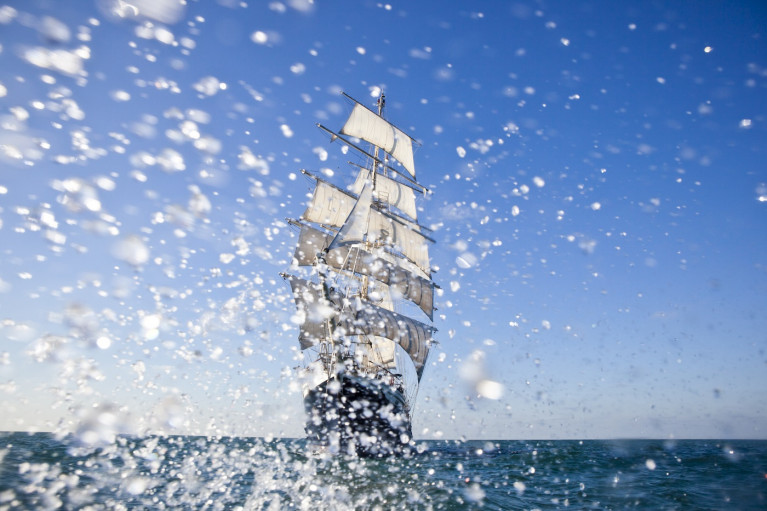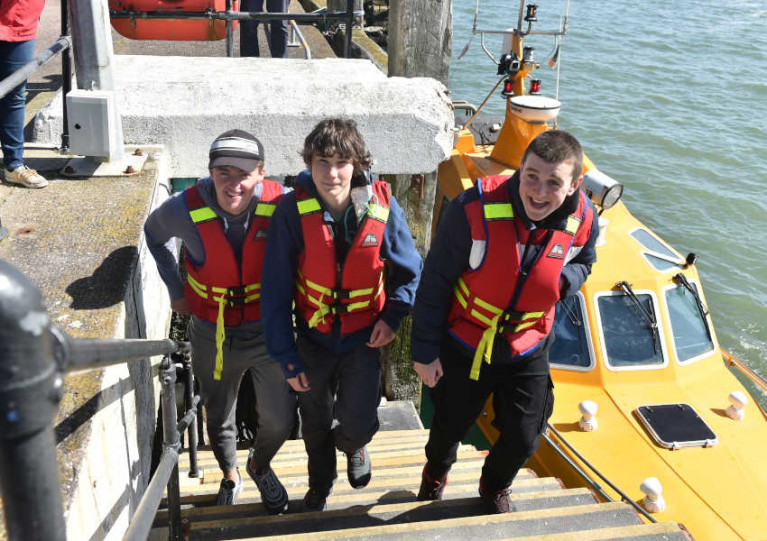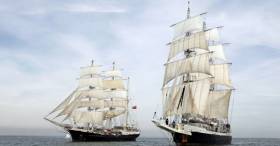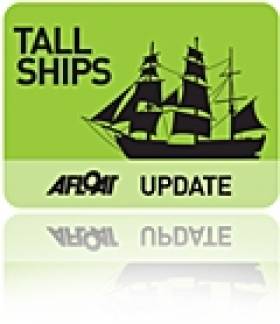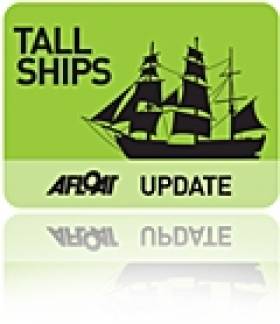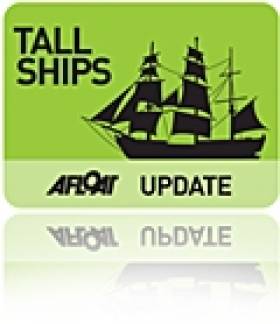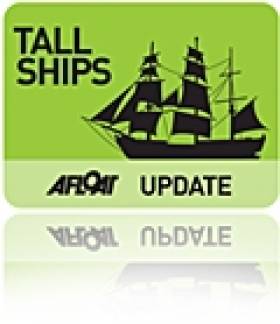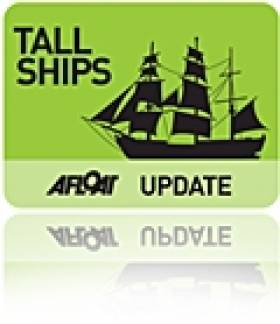Displaying items by tag: Jubilee Sailing Trust
Marine Industry News reports that the Jubilee Sailing Trust (Tenacious) Ltd has closed and its assets, including the tall ship Tenacious, will pass into receivership.
It follows the auction earlier this year of the JST’s former flagship tall ship Lord Nelson after the troubled charity was placed into administration in August 2022. The ship was not sold as there were no buyers.
While the Jubilee Sailing Trust charity remains active as a separate entity, it faces the prospect of a Charity Commission as to whether it too can continue.
As previously reported on Afloat.ie, Tenacious is not only the largest wooden tall ship of her kind in the world but also has access throughout for people with various disabilities.
However, as the statement announcing the closure says: “Unfortunately neither our voyage sales nor our fundraising efforts have been successful in meeting the circa £150k/month required to operate Tenacious and keep her legally compliant to deliver our voyages, nor to repay the historic debt (circa £477k) accumulated prior to the September 2022 change in strategy.”
Marine Industry News has more on the story HERE.
This story was updated on 19 December to clarify that the tall ship Lord Nelson was not sold in its 2022 auction.
Tall Ship ‘Lord Nelson’ Put Up for Sale by Online Action
Lord Nelson, the former flagship tall ship of the Jubilee Sailing Trust, has been put up for sale by online auction.
Global advisory and investment firm Gordon Brothers was last October appointed as exclusive selling agent for the tall ship on behalf of the Jubilee Sailing Trust Limited after the troubled charity was placed into administration.
It’s now offering the vessel for sale by online auction with bids opening at £150,000 and accepted until Friday 30 June.
Built in 1985, Lord Nelson is the first tall ship in the world designed to accommodate personnel of all physical abilities to sail alongside the ship’s crew.
The 55-metre, 368-tonne sail training barque — which was decommissioned in 2019 — includes accessible toilets, a speaking compass, braille and power-assisted bridge.
Announcing the auction on Wednesday (7 June), Simon Bamford, director of commercial and industrial at Gordon Brothers said: “Lord Nelson is back on the market and presents a fantastic and rare opportunity to acquire a vessel through an online auction within the international marine markets.
“This historic and renowned training ship accommodates any individual who sails and has circumnavigated the globe and sailed at various races and regattas.”
In the UK a charity based in Southampton which is offering tallship sailing experiences for those with disabilities could face closure unless it raises £500,000 to keep afloat.
As ITV News reports, The Jubilee Sailing Trust says it will be forced into administration if it does not raise the money by Thursday 14 April, and a total of £1.2 million by the end of September 2022.
The charity cited the effects of the pandemic leading to an immediate cash flow crisis.
JST CEO Patrick Fleming said: “We are in a desperately difficult situation and have to face the harsh reality that we may not be able to continue."
He added: “Our co-founder, Christopher Rudd, first began working with disabled children by teaching them to sail in dinghies. He believed that most of the constraints that prevented them sailing further offshore were artificial and could be overcome.
"He also believed that if disabled and non-disabled people were to sail alongside each other, it would help break down the prejudices and misunderstandings between different social groups. His vision was to use thoughtful design and equipment to create a fully accessible ship to be crewed by a mixed ability crew."
In 2019 as Afloat reported, it faced a similar ultimatum and had to raise £1m to keep running, but luckily managed to gather the necessary funds.
For further coverage click here.
‘Tenacious’ Teens Disembark At Cobh In A Changed World
A group of Transition Year students stepped into a strange new world when they disembarked from a month at sea on a tall ship sail training voyage.
The eight teenagers arrived in Cork Harbour on Tuesday 7 April on the SV Tenacious, which had sailed since early March from the Caribbean to the Mediterranean — with little knowledge of how daily life has changed in Ireland in the intervening weeks.
As Antonia O’Rourke of Viking Marine tells Afloat.ie, all the boys on the mixed-ability voyage with the Jubilee Sailing Trust have previous sailing connections.
Conor Galligan and Conor Walsh, for instance, both enjoy racing Lasers in Dun Laoghaire and Cork respectively, and are also qualified dinghy instructors hoping to put that training into practice this summer.
Charlie Kavanagh and Aiden Colbert are no strangers to sailing, either — the latter with cruising experience, while the former has sailed with his family.
Perhaps the best equipped was Sam Duncan, of the National Yacht Club, who joined a tall ship voyage last year with another charity — the Rona Sailing Project — which he enjoyed so much he was looking to expand his offshore miles while also qualifying as a dinghy instructor this season.
But while their prior experience on the water set them in good stead for a month on the high seas — honing essential seafaring skills along with 40 other crew — nothing could prepare them for what awaited as they landed in Cobh this week.
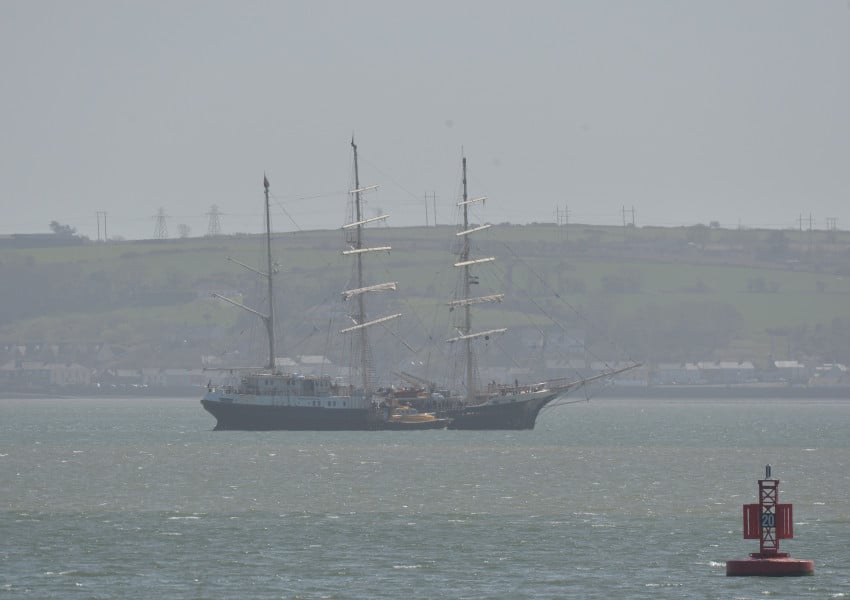 The SV Tenacious at anchor in Cork Harbour on Tuesday
The SV Tenacious at anchor in Cork Harbour on Tuesday
Concerns started to brew just days into their voyage as the scheduled host port in Greece was closed to visiting boats under strict measures against Covid-19.
Parents of the young crew, two of whom have underlying health conditions, were relieved by Jubilee Sailing Trust’s immediate decision to return to the UK, via the Azores and Cork Harbour — with no shore leave granted for the safety of the crew, who were essentially coccooned from the pandemic throughout.
The last leg of that journey, traversing the North Atlantic from the Azores to Ireland, presented a genuine challenge to the young sailors, with three days of gale-force winds to contend with.
But a different challenge faced them on arrival in Cork in Tuesday, when the eight Irish crew were said to be taken aback by the ‘new normal’ of social distancing and the shutdown of the economy.
Robbie Byrne from Greystones said: “It was a big shock coming back to Ireland today and seeing people wearing masks and everyone being told keep their distance and of course driving home, the roads were empty, there was no one out.”
The Irish Times has much more on the story HERE.
UK Based Jubilee Sailing Trust Fights for Survival
In the UK a Southampton based sailing charity has launched an emergency campaign to raise £1m by tomorrow (Friday 5th July) or face a bleak future.
The trustees of Jubilee Sailing Trust (JST) according to the Southern Daily Echo, has launched the rescue effort to address "serious financial challenges" and to continue operating.
If unable to reach the £1m target by the end of the week it will "cease to exist immediately", unless another solution is found.
Based in Woolston, the JST has been struggling financially for the past year following a number of mechanical problems on both of its ships.
Similarly, a poor uptake for its winter 2018 programme has had negative financial impacts.
Founded in 1978, the JST owns the Tenacious and Lord Nelson which are two specially adapted traditionally-rigged sailing ships.
They are the only ships in the world designed to be sailed by a crew with a variety of physical impairments and health conditions.
Click here for more on the story.
Volunteers Sought for Tallship that’s Going Bottom's Up!
#TALLSHIPS – What are the chances of getting to see the underside of a ship's hull, let alone the rare opportunity to carry out work on a tallship, look no further than the STV Tenacious, writes Jehan Ashmore.
This unique opportunity to see the hull exposed is to take place this month when the Jubilee Sailing Trust's 65m barque is to undergo anti-fouling work during an 18 day dry-docking. She has only been out of the water twice in the last five years.
Currently the vessel is berthed in Dun Laoghaire Harbour, though is to depart this morning bound for Milford Haven, her final port of call of a seven-day voyage, however she will remain in the Pembrokeshire port where there is a dry-docking facility.
If you can spare the time, volunteers would be most welcomed by the JST to help transform Tenacious, where a successful fundraising effort has raised funds to complete phase 1 of a routine refurbishment needed for the vessel.
Volunteers will be required to carry out the following jobs such as painting the hull, taking off and putting back the rudder, checking the anchors and chains, removing life-rafts for service, taking down yards and overhauling them.
Also involved will be the changing of the "cell" in the sewage plant and work on the master magnetic compass – otherwise known as replacing the "jewel".
So if you want to get up close and personal with a tallship –contact the JST on 00 44 (0)23 8044 9108 Email: [email protected] and by clicking HERE.
Tallship’s Dublin Call ‘Open’Day
#TALL SHIP- The tallship Tenacious which arrived yesterday to Dublin Port, is to host an Open Day to the public this Sunday 21st October at Sir John Rogerson's Quay, from 10am - 12.30pm and 2pm - 4pm.
The 65m barque is operated by the Jubilee Sailing Trust, and alongside her fleetmate Lord Nelson, are the only such tallships in the world that cater for trainee sailors of all physical abilities.
Sail Training Ireland have announced that there are limited places still available for this October's Tall Ship voyages around the Irish Sea aboard the vessel. For further details contact the Irish Branch of the JST on 01 496 0735 and in general by visiting www.jst.org.uk
Irish Sea Tallship Sailing Voyages
#TALLSHIP VOYAGES – There are three sailing voyages around the Irish Sea this October on board the Jubilee Sailing Trust's 65m barque Tenacious, the fleetmate of Lord Nelson which as previously reported, called to Dun Laoghaire recently, writes Jehan Ashmore.
The JST provides tallship training access to all able bodied and disabled sailors, from those aged 16-99 years and with no experience is necessary!
The three Irish voyages will include calling to ports in Belfast, Dublin and Waterford. Tenacious has 40 trainee places on each of the three voyages which will call to port and the JST is offering a "two-for-the-price-of-one" offer as well as discounted rates.
All offers have a discounted cost but if you would like to do two voyages you can pay brochure price for the first voyage and get the second voyage for free or alternatively bring a friend for free on any of the voyages.
Crew are needed to sail on the following voyages (please not prices in £ Pounds Sterling):
TNS356 Southampton - Dublin 11 - 20 October Brochure Cost: £775 Discounted Cost: £399 To book online click HERE
TNS357 Dublin - Belfast 22-28 October Brochure Cost: £525 Discounted Cost: £299 To book online click HERE
TNS358 Belfast - Milford Haven 29 October - 4 November Brochure Cost £525 Discounted Cost £299 To book online click HERE
For further information in general about the Jubilee Sailing Trust visit: www.jst.org.uk
Tallship For All Follows In Wake of MOD70 City Races
#TALL SHIP- The UK flagged tallship Lord Nelson, built specifically to enable people of all physical abilities to sail side-by-side as equals, last night anchored off Scotsman Bay. It was in these inshore waters recently where the impressive MOD70 'City' Races took place off Dun Laoghaire Harbour's East Pier, writes Jehan Ashmore.
The barque is run by the charity, Jubilee Sailing Trust (JST), and she followed in the wake of another albeit smaller tallship, Vilma, which too had anchored in Scotsmans Bay, though much closer to the shoreline. The Welsh schooner registered in Beaumaris, was in the flotilla with spectators to witness the MOD70s as the high-tech 'Formula 1' of boats belted across Dublin Bay.
JST also own another barque, the Tenacious, and both vessels are regular callers to Irish ports, where they provide sailing holidays for everyone to experience the thrill and adventure of life at sea and get involved in almost every activity on board. This can involve taking the helm, setting the sails and keeping watch, regardless of physical ability and previous sailing knowledge.
For details of voyages around the UK and Ireland click HERE, noting the vessels also cruise in far distant waters. For example Lord Nelson is scheduled to depart on a voyage from Kochi in India next year.
Tall Ship Sail Training Open to All With Autumn Voyages
#TALL SHIPS - Sail Training Ireland for Youth Development (STIYD) has announced a golden opportunity for the general public to sail on a tall ship.
Hot on the heels of the Tall Ships Races visit to Dublin this August, a series of three tall ship voyages have been scheduled to take place to and from Irish ports by the UK-based Jubilee Sailing Trust (JST) on its 65-metre tall ship Tenacious between 11 October and 4 November 2012.
The first sailing from Southampton to Dublin (via Waterford) runs for 10 days from 11-20 October, followed by a seven-day jaunt from Dublin to Belfast from 22-28 October, and another seven-day trip from Belfast to Milford Haven from 29 October-4 November. Each voyage will have room for 40 trainees.
Anyone aged 16 and above can join the voyage crew as a trainee, and no previous experience is necessary.
Tenacious is also specially designed to cater for the needs of people with varying degrees of physical disability, including wheelchair users.
Features on board Tenacious and her sister ship Lord Nelson include signs in braille, lifts between decks, power assisted and 'joystick' steering, wide aisles and low-level fittings, guidance tracks and other on-deck pointers, and a speaking compass with digital screen.
STIYD says it is committed to providing access to tall ship sailing for the people of Ireland. The JST has also offered these voyages at a greatly reduced rate to encourage Irish trainees to get on board with what is hoped can become an annual event.
“It is great to see that the international tall ship fleet is reacting to recent activity in Irish sail training," said Michael Byrne, manager at STIYD. "Now that there is a central point of contact for trainees and vessel operators through STIYD, we can expect to see more and more of this kind of activity.
"When the JST approached us with a proposal to run their Irish Sea programme we offered our full support in promoting the opportunity. A unique and hugely important aspect to the JST is its ability to cater for people with varying degrees of physical ability.”
Kyle O’Regan of STIYD's youth branch added: “It is great for Irish trainees that the JST has arranged for Tenacious to have an Irish Sea programme. Being able to join or leave in your own country is a major advantage in terms of lowering costs.”
Meanwhile, the JST's Grainne Arntz said the charity has shown its "commitment to Ireland" by scheduling these autumn voyages.
"Three years ago we introduced the Ultimate Transition Year Tall Ship Adventure, a programme whereby groups of Transition Year students from Irish schools experience the challenge of tall ship sailing with diverse people.
"These voyages in the autumn will allow more groups and individuals to avail of the unique JST experience of sailing on a tall ship with people of all ages and abilities.”
The tall ship voyages are priced at £775 per person for the 10-day trip, and £525 per person for the seven-day excursions. To book your voyage with the JST visit their website HERE or call +44 23 8044 9108.
For information on the Irish branch of the Jubilee Sailing Trust visit www.jstireland.ie. For general information on sail training activities in Ireland contact Sail Training Ireland, Port Centre, Alexandra Road, Dublin 1 at 01 887 6046, e-mail [email protected] or visit www.irishsailtraining.com.
STIYD is the national sail training organisation for Ireland and is endorsed as such by Sail Training International. The vision of STIYD is to “provide access to the sail training experience for the people of Ireland”.


























